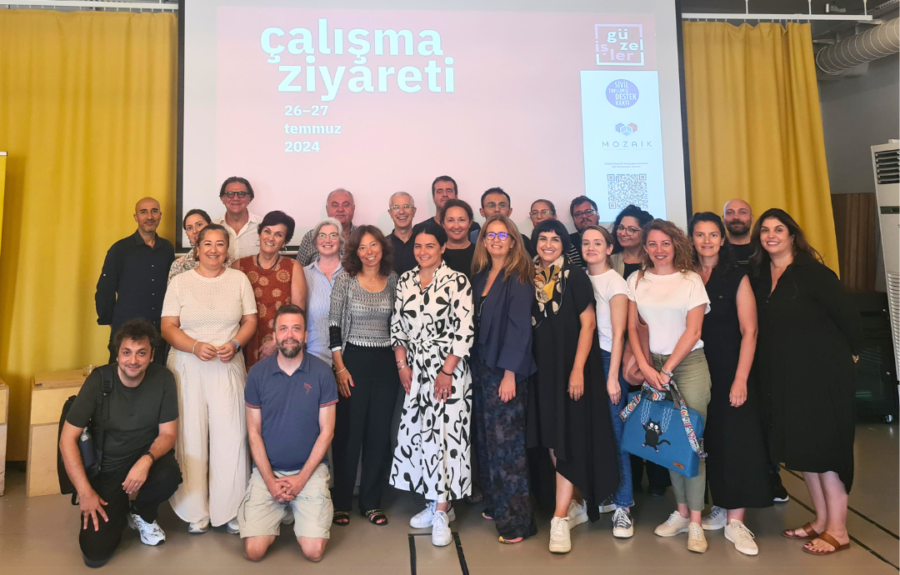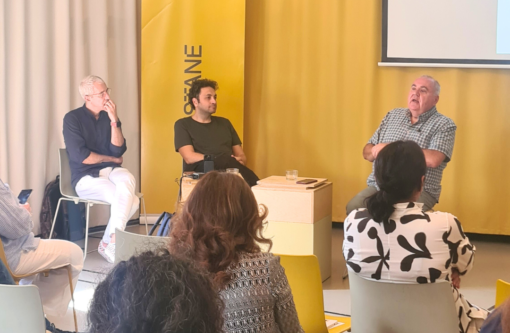
[vc_row][vc_column][vc_column_text]On 26-27 July, we had an inspiring two days on our sixth Study Trip, held at the historic Postane Istanbul, once known as the British Post Office in Galata, Beyoğlu. The event brought together civil society experts and our grantees for meaningful discussions on pressing issues and inspiring stories.
Find out more about our amazing speakers and the discussions by reading our detailed account below.
Watch the video to get a first glimpse and feel the energy of our event. Stay tuned for more videos! [/vc_column_text][vc_video link=”https://youtu.be/2wf6FTmi5HU?si=c3A3hDhJOWWy_NRM”][vc_column_text]
DAY 1 – July 26th
The day began with a panel on Türkiye’s journey through its past, present, and future, led by Mehmet Ali Çalışkan from the Reform Institute. He emphasised the need for civil society to offer young people alternatives and tools for participation, noting their belief in being impacted by political decisions while feeling powerless to influence them.
In the second session, we explored gender equality challenges with Gül Erdost from the Women’s Coalition and Başak Tuğsavul from the Silva Association. The Women’s Coalition advocates for women’s participation in local politics and equal access to rights and services, while the Silva Association promotes gender equality and women’s rights through various initiatives, fostering a culture of feminist philanthropy.
Erdost shared insights into the work of the Women’s Life Centre in Adana, supported by our Kahramanmaraş Earthquake Emergency Relief Fund. The centre provides counselling, workshops, safe spaces, and laundry and shower facilities for earthquake-affected women and children. Tuğsavul highlighted the growing difficulty women’s organisations face in accessing resources, as revealed by their research.
Başak Tuğsavul: “Young people are starting to discuss previously taboo topics, forming organisations aimed at bringing these issues into the public sphere.”
The afternoon session focused on education in Türkiye, with insights from Burcu Gündüz Maşalacı of Suna’nın Kızları and Ekin Gamze Gencer from the Education Reform Initiative (Eğitim Reformu Girişimi). Gencer highlighted long-standing issues in Türkiye’s education system, such as regional disparities in enrollment. The Education Reform Initiative, an independent non-profit, provides policy recommendations and fosters dialogue to improve education policy and practice.
Maşalacı stressed that high school enrollment rates alone don’t lead to improvements in social and economic life, pointing to the rise in child labour and the absence of official statistics on child, early and forced marriages. She emphasised the importance of investing in the well-being and safety of children aged 0-3. Suna’nın Kızları supports girls’ freedom of choice and collaborates with various stakeholders to create a supportive ecosystem for children.
Burcu Gündüz Maşalacı: “The possibilities for two girls in Türkiye to come together and spend time without any risk of violence are so limited.”

The day concluded with a discussion on press freedom with experienced journalist Ferhat Boratav and Sarphan Uzunoğlu from NewsLabTurkey. Boratav discussed the shrinking newsrooms and the importance of civil society organisations communicating their stories directly to their audiences. Uzunoğlu, from NewsLabTurkey, which creates learning opportunities for independent media and journalists, noted the lack of universally accepted fundamental principles of journalism in Türkiye.
Ferhat Boratav: “The link between civil society’s messages and politics has vanished. The media once played a crucial intermediary role in this relationship.”
DAY 2 – July 27th
The second day began with a session on the impact of the Kahramanmaraş earthquakes on youth, featuring Göktan Yıldırım from the Roma Memory Studies Association (Romani Godi) and Hasan Oğuzhan Aytaç from GoFor. Aytaç shared findings from the “Research on Political Preferences of the Youth 2024,” highlighting young people’s desire for proportional political representation and their distrust of political parties.
Yıldırım provided insights into the Roma community in Türkiye, estimated to be between 3,5 to 6 million, though exact numbers are unknown due to the lack of official data. He discussed the challenges Roma youth face in civil society and their preference for staying within their communities for safety.
Göktan Yıldırım: “Political participation was once a significant demand of the Roma community, but now economic survival and combating poverty are more pressing concerns.”
We concluded with a discussion on personal freedom boundaries with Yalnız Yürümeyeceksin, a platform that offers a safe space for young people to share how religious backgrounds and discourses have affected their lives. The platform provides a solidarity network and various forms of support, including economic, legal, and psychosocial assistance.
Our heartfelt thanks go to all the speakers and participants for making this event so impactful. Special thanks to the Support Foundation for Civil Society (Sivil Toplum için Destek Vakfı), our partner in Türkiye, for organising this trip and being exceptional hosts.
We look forward to seeing you at next year’s Study Trip! [/vc_column_text][/vc_column][/vc_row]



